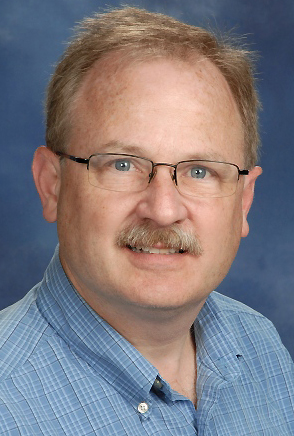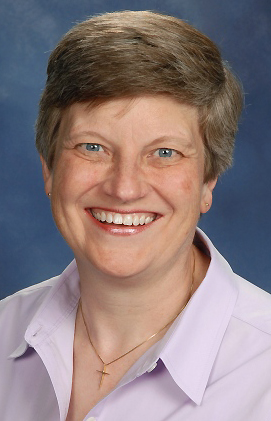news article
Get to know UNY’s newest District Superintendents
September 3, 2014 / By Beth DiCocco / .(JavaScript must be enabled to view this email address)
We asked the Upper New York Conference's newest District Superintendents – the Rev. Jeff McDowell of the Finger Lakes District and the Rev. Nancy Adams of the Mountain View District – a few questions to help folks get to know them.
A Welcome Service for Rev. Adams will be Sunday, Sept. 14, 2014
A Welcome Service for Rev. McDowell will be Sunday, Sept. 21, 2014
Read the original announcement of their appointments.
Rev. McDowell
How have things been going so far? It has been a great experience meeting with the Cabinet since February (during the appointment season) and seeing the sacred trust with which they approach their work. Much prayer and discernment is put into the work on the Cabinet, as Bishop Mark J. Webb sets a very spiritual tone. Since July 1, 2014, I have been mostly getting to know people and figuring out this new role. I will let you know when I have it all figured out.
What have you found to be the biggest transition from leading a local church to leading a district? The biggest transition has been the absence of calls for pastoral care of members, and the loss of connection with people as their pastor. Not preaching and leading worship each Sunday is a big change after 25 years of doing so! Perhaps the largest future change will be leading the way in mission and ministry over a much larger area than just one parish.
What do you think makes a good District Superintendent? The call of Jesus to go out into the world and make disciples is clear (Matthew 28:20), and a good Superintendent creates space and time to foster that and (where needed) ignite that in a district. The six Superintendents I have had over 25 years set a tone of loving Christ, loving their pastors and churches, and calling out the best in all of them. I also believe the only way to be effective as DS is through teams of laity, elders, and local pastors. Where are the teams? I vow to find them and if needed, form them.
What do you believe are the greatest spiritual gifts that you bring to your role as a DS? I listen and discern with the help of the Holy Spirit in the body of Christ. I believe leading with compassion is a strength, as well as a special brand of wisdom that has come through making tons of mistakes. I do not do ministry alone. I depend on and utilize the gifts all around the church. I register high on the prophetic and pastoral gifts with leadership up there as well. Time will tell. (See Romans 12)
What are some of your goals for your superintendency? I will be looking for ministers of Christ (clergy and lay) who I can come alongside, who have an outward focus and who refuse to lead a dying church. New thoughts and new ways of doing things, inspired by God, can and will revive the church in the Finger Lakes and across the connection. I also plan to divide the district into smaller groupings, under the leadership of connecting elders, to see where we can be in mission together with God’s love. No church needs to close here; the fields are ripe for harvesting (Matthew 9:37,38). We just need to pray for more workers to respond to God’s "want ads."
What do you think makes a vital church? A vital church worships Jesus Christ first and spends time in prayer to see what God sees and hear what God is saying for vison and direction. Then, when clear about direction, a vital church lays down past policies and pet projects so it can be in ministry in real time, under leadership of those whom God calls. A vital church is known in its community for what it is doing, not for what it claims to believe! A vital church counts how many are doing mission, not how many people come sit in a wooden pew on Sunday mornings. A vital church tears “no trespassing” signs from their property and puts up “welcome home” signs, and means it.
What is the DS's role in creating vital congregations? In 2012, the General Conference made the main task of a DS to be “missional strategist of a district.” This means to me we are to assess the district to find out what are strengths and what are open mission doors, then raise up their urgency. Once current and potential missions are identified, a God-given strategy must be developed, launched, and resourced so people can plug into them easily and without lots of red tape. Could it be that when mission for Christ is primary, we will need more buildings to house our ministries and not fewer? Count the people around you.
Talk about how you first experienced a call to ministry: While at college in Berea, Ky., for Industrial Arts Education, I felt/heard/experienced a call of God to change my major to Religion, and prepare for full-time ministry. I grew profoundly with Christian fellowship during those years. I had no idea what direction that would take, but as I obeyed God, each step became clear as I walked the path of discipleship. I was called to seminary, then called to pastor in the Conference I had grown up in. Casowasco church camp is where I first believed in God.
What do you like to do for fun? As a family, we love to kayak, bicycle, hike, swim, and take walks. We have always enjoyed the beauty of nature, especially in Central New York. Anything active and outdoors, in any season, gives us life and fun.
What is your favorite place to eat while on the road or a new favorite place (given that you will be/have been recently traveling a lot more)? Actually, I am trying to avoid putting on the "freshman 15 (pounds)." I prefer to bring healthy meals when traveling. But ice cream probably doesn't count, right?
Rev. Adams
How have things been going so far? Things have gone well so far, although there have been some challenges along the way, and the learning curve is still quite large. Pastors and lay persons I have met have been very gracious in that regard. Thanks be to God!
What have you found to be the biggest transition from leading a local church to leading a district? Driving to the office and sitting behind a desk all day is certainly new. Not preparing a sermon each week has freed me up to do other things, but I do miss preaching. I am grateful for the invitations I have gotten to preach. Not having the fellowship of a congregation to relate to week-in and week-out is something I really miss a lot. I have enjoyed meeting people throughout the district, though, and look forward to meeting more.
What do you think makes a good District Superintendent? Good listening skills are a must – hearing what is being said – and what is not being said … I endeavor to be pastoral and also to be a strong spiritual leader, always pointing us to Christ. I desire to always be gracious, approachable and a non-anxious presence in each and every situation. When I have failed to do this, I have asked for forgiveness to those I have hurt.
What do you believe are the greatest spiritual gifts that you bring to your role as a DS? My three highest spiritual gifts are shepherding, faith, and evangelism, all of which I trust will be very useful in this role.
What are some of your goals for your superintendency? Obviously, making disciples of Jesus Christ inside and outside the church is paramount. That being said, one goal is for every pastor and congregation in the Mountain View District to be able to articulate that our mission is to make disciples of Jesus Christ for the transformation of the world, and to live the Gospel of Jesus Christ and to be God’s love with our neighbors in all places. Another goal is to do it!
I have been and will continue to challenge each congregation to go outside the walls of the church building with the love of Christ more than once or twice a year. We are already making plans to bring some small-group training events to the district to enable this disciple-making and nurturing tool to become more prevalent in and outside our churches.
What do you think makes a vital church? As I’ve said many times, without prayer, nothing! A vital church is a praying church. I have found Bishop Robert Schnase’s book, Five Practices of Fruitful Congregations an extremely helpful resource. In it, he mentions radical hospitality, passionate worship, intentional faith development, risk-taking mission and service, and extravagant generosity as signs of vital congregations. Dovetailing well with those are the eight factors in “Natural Church Development,” which are empowering leadership, gift-based ministry, passionate spirituality, effective structures, inspiring worship service, holistic small groups, and need-oriented evangelism. While those are all signs of vital congregations, I would add joy, grace, and compassion along with Acts 2:42: “They devoted themselves to the apostles’ teaching and fellowship, to the breaking of bread and the prayers.”
Focusing on Christ goes without saying, but I’ll say it anyway. Making disciples of Jesus Christ of children, youth, and adults is at the core of all congregational life of a vital church.
What is the DS’s role in creating vital congregations? I can continually point us to Christ and encourage and challenge pastors and congregations to focus on being vital – not on survival. I’ve said many times that survival is not a vision! I will remind us all that we are not to make decisions out of a position of fear. I am in prayer for all in the Mountain View District, and wish to be of support in any additional ways I can.
Talk about how you first experienced a call to ministry: It was while I was a special education teacher at Candor High School full time and getting my M.S. Ed. part time at SUNY Binghamton (now Binghamton University), that I heard God calling me to ordained ministry. Several people had come to me encouraging me to pursue ordained ministry as a vocation. I was able to ignore these comments when they first began to surface. Lay speaking and other affirming experiences later brought the comments to mind, but I still did not take them seriously. The “gnawing” in my heart wouldn’t go away. I felt like if I didn’t share, I was going to burst … . As I said, I went to Lay Speakers’ training and had some opportunities to engage in music ministry, but the gnawing persisted. The comments soon started coming in greater number, with greater frequency, and with greater intensity. I then began to nervously contemplate my blindness to what others saw in me. I could ignore this possibility no longer, and began candidacy studies. Like Jonah, I found that it is futile to try to run from God’s call… The minute I decided to go to seminary, the gnawing was replaced with peace…
What do I like to do for fun? I enjoy playing guitar and piano. I have taken classical guitar lessons for years, and would like to begin again. I also enjoy going out to eat with friends, which doesn’t happen as often as I’d like.
What is your favorite place to eat while on the road or a new favorite place (given that you will be/have been recently traveling a lot more)? I don’t really have one yet. I’m open to suggestions!